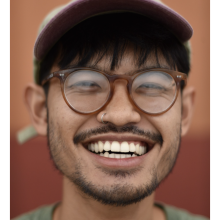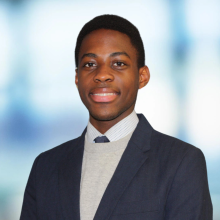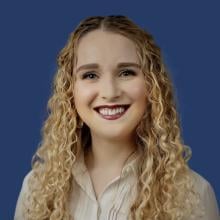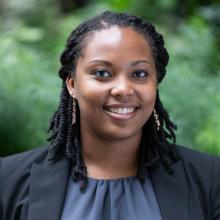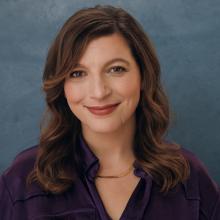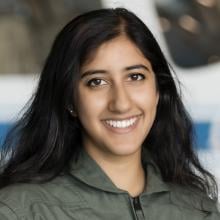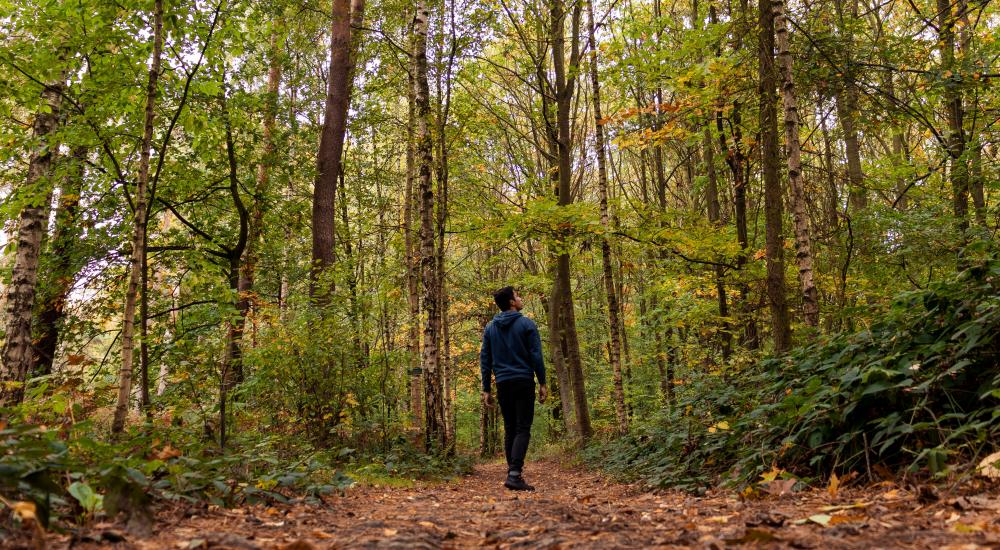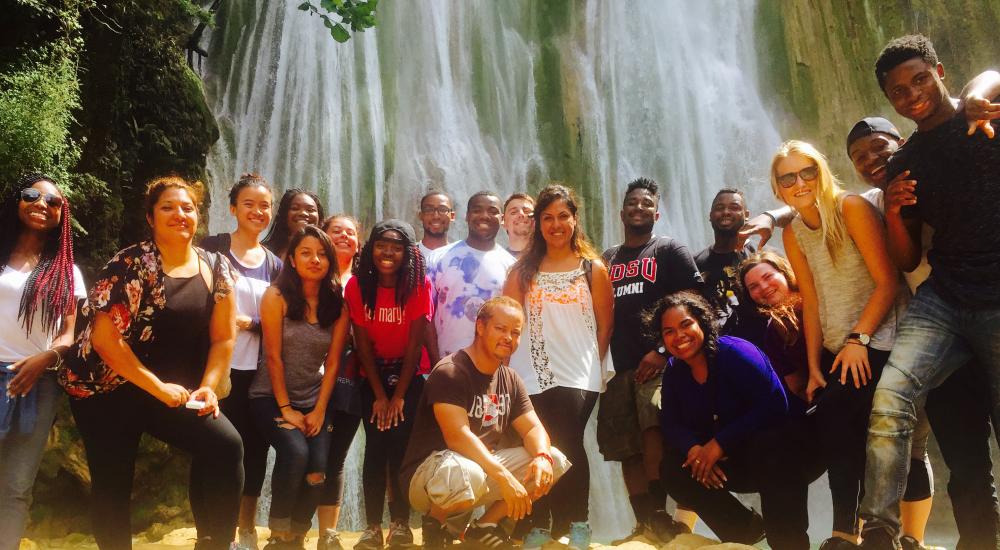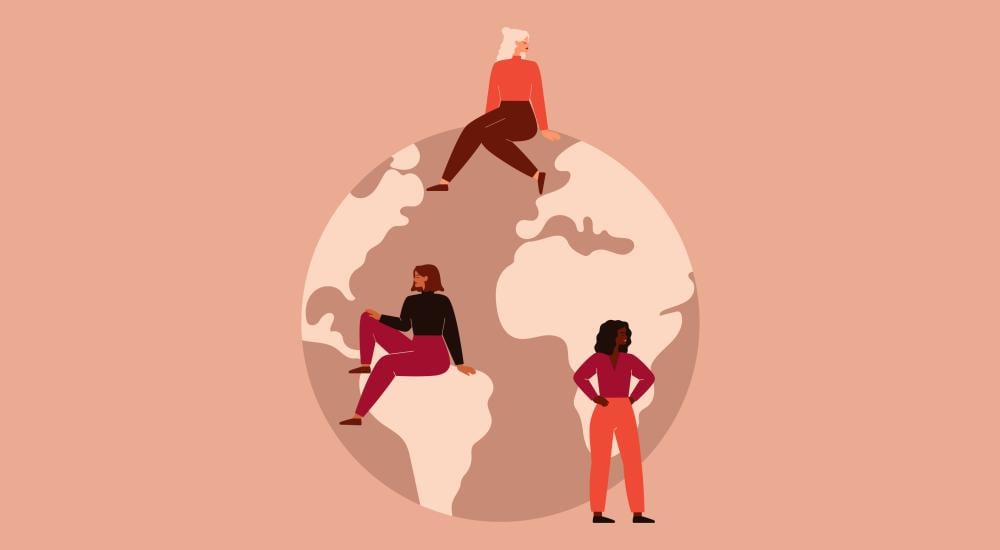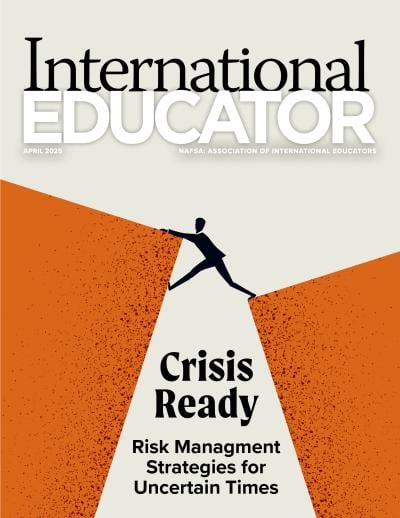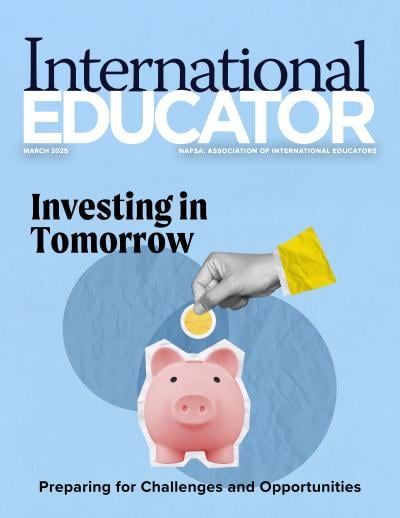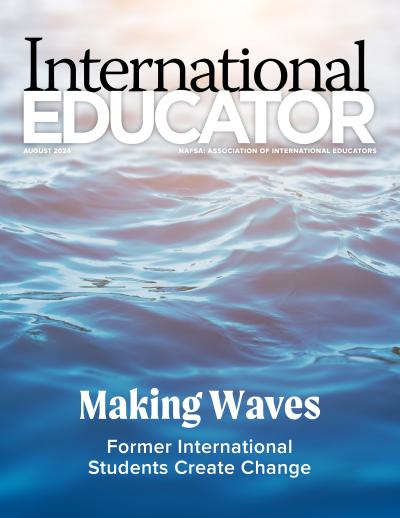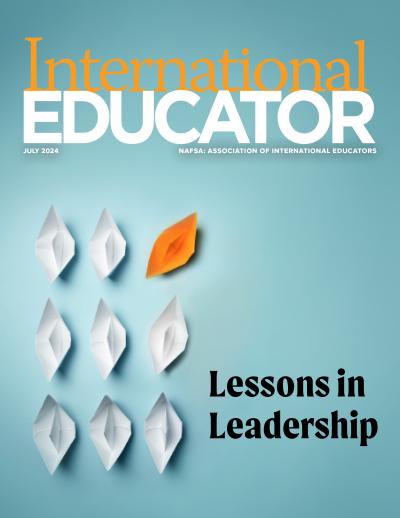Broader Horizons: Study Abroad Alumni Share Their Journeys
In the last two years, demand for education abroad has rebounded since experiencing a huge dip during the COVID-19 pandemic, with almost 281,000 U.S. students studying abroad in 2022–23, up from 14,549 in 2020–21. Almost two-thirds of these students studied in Europe, followed in popularity by Asia, Latin America, Oceania, and Africa, according to the Institute for International Education Open Doors data.
From traditional semester exchanges to specialized short-term programs in renewable energy and environmental science, students choose programs that range in duration from a few weeks to a full academic year. For many, these experiences extend far beyond the classroom and time spent abroad, shaping their worldviews and career trajectories.
International Educator spoke with seven education abroad alumni about how studying abroad shaped their personal and professional lives. Many talked about how their education abroad experience led to new career choices and professional opportunities. Some discovered new passions, while others reconnected with their cultures. It also helped them gain resilience, independence, and a sense of understanding.
Editor’s note: These interviews have been lightly edited for length and clarity.
Kevin Pham
Hometown: Olney, Maryland
U.S. alma mater and major: Vassar College, international studies
Study abroad program and location: Ann Cornelisen Post Graduate Language Study Fellowship, Vassar College, Vietnam
Tell us about your experiences abroad.
Before college, I took a gap year with this organization that was then called Global Citizen Year. In Ecuador, I was living with an Indigenous family in the Amazon Rainforest and interning at a rural health clinic. It was very different from the academic environment that I was used to.
I spent my full junior year of college in Jordan at the University of Jordan. I ended up getting the Boren Award and stayed there for another year. I graduated from Vassar in 2020 and then worked for a few years. Last year, I got an alumni scholarship to go to Vietnam for a year.
Going to Ecuador during that period of my life, even though I didn't know it at that time, shaped my worldview in very deep ways that continue to have an impact beyond that year. It’s impacted me in the career I've chosen, the classes I chose to take in college, and who I choose to align myself with. It politicized me in many ways, in particular on global inequities. That experience led me to Jordan and Vietnam.
Why did you go to Vietnam for a postgraduate fellowship?
I grew up speaking Vietnamese with my family. When I went to Vietnam with the alumni scholarship, it was my first time going as an adult. It was really emotional for me, because I was 6 years old the last time I was back. I felt so deeply connected over there.
There's a particular term in Vietnam that’s used for Vietnamese people who spend time abroad and then come back or people who are heavily shaped by culture outside of Vietnam: “Việt Kiều.” I'm considered Việt Kiều since I'm ethnically Vietnamese, but I was born and raised in the United States.
Going to Ecuador during that period of my life, even though I didn't know it at that time, shaped my worldview in very deep ways that continue to have an impact beyond that year.
“Emotional roller coaster” would be the best way to describe my experience. It was a lot, but then a friend gave me this really good perspective [on Việt Kiều]. She said the concept has a bigger political and historical context attached to it. She told me I was part of that fabric. It’s not that you are any less Vietnamese for not having been born and raised in Vietnam. You are a part of the Vietnamese story, and a part of the Vietnamese story involves the diaspora. That really helped me conceptualize myself within the Vietnamese community. I spent a lot of time in the United States, and I am a Vietnamese person, and both can exist together in the same space.
How did your time abroad influence you professionally?
My time in Vietnam allowed me to just sit and think about how I want to spend the rest of my professional life. I think it’s going to be a career pivot. I want to work with queer and trans communities or other marginalized populations, whether that be undocumented people or folks with limited English proficiency in the U.S. context. I think that my time in Vietnam, Ecuador, and Jordan have kind of led me to think about what career path I can follow to work with underrepresented groups or populations that don't often get the support that they need.
Floyd Beaufort
Hometown: Waterbury, Connecticut
U.S. alma mater and major: University of Connecticut (UConn), political science and German studies
Study abroad program and location: Tübingen, Germany, through a partnership with the German state of Baden-Württemberg and the state of Connecticut
Current job title: Program coordinator; applying to graduate school
What motivated you to study abroad?
I started learning German on Duolingo with a friend of mine just for fun and to pass time back in high school. I kept learning German on my own and taking German language and culture classes [in college] and organized [my own] study abroad experience with the help of the Global Learning Office at the UConn.
I mostly studied the German language while I was in Tübingen. I took a German literature course. I took some art classes and a lot of intercultural communication classes as well. In the beginning, we had this course to kind of get us up to speed on our German. We had different people from all over the world—from South Korea, Sweden, Japan, the United States—and [the school] analyzed our various German speaking levels and organized us into classes. That was actually where I made the bulk of my friendships in Germany
What impact did the experience have on you professionally?
My time in Germany allowed me to kind of rethink what I thought I wanted to do initially. I had no idea what I was going to do next, to be honest, because I have so many interests, and I know there are so many different avenues I can go through to achieve them. But after going to Germany, I want to go back there to do my master’s in international affairs in Berlin. I want to take a year in the United States, get some experience, and move to Berlin afterward to pursue my graduate degree.
Studying abroad changed what I thought I wanted out of my career... But now my values have changed.
How has the transition back home been since you came back after six months in Germany?
When I came back, I was expecting to just take some time to myself and acclimate to things, but my family had actually moved while I was away. I came back to an entirely different house and had to establish an entirely new rhythm. I had to start dropping my sister off at school, because we lived further from the school. I had to jump right into a fast-paced life, considering I transitioned from a slower time period because I had spent the last month abroad in Italy with a friend of mine. I don't think I had enough time to actually process everything I'd been through. So, that used a lot of my energy. I would feel so tired and not really know why. It's just because my brain was processing so much stuff all the time.
Studying abroad changed what I thought I wanted out of my career, because for so long in the United States, my thought was, “I'm going to go to college, and then right after college, I'm going to do this job, and I'm going to do it for years and years and years.” But now my values have changed. I want the flexibility to be able to go on vacation.
Lauren Sorensen
Hometown: West Bend, Wisconsin
U.S. alma mater and major: University of Wisconsin-Madison, political science and French
Study abroad program and location: University of Minnesota, Senegal
Current job title: Third-year law student at Harvard Law School
Why did you choose Senegal for your study abroad experience?
I came into college and declared my French major right away. I also came into college 1,000 percent convinced I needed to study abroad before I graduated, and I met with advisers pretty early on during my freshman year. I went in planning to study abroad in France, but I had a political science adviser who said, “They speak French in a lot of countries.” I am so grateful to that adviser, who encouraged me to do a little bit of exploration. Part of the motivation for choosing Senegal was that I knew that I was going to have a very different cultural experience there than what I was used to.
The program I ended up doing was actually offered by the University of Minnesota, [and it was] broadly focused on development studies. They had a bunch of different tracks, [and] I chose the child rights track. It was a cohort of about 20 students. Part of the time we were in the classroom, and then for the last six weeks of the first semester, we had internships. I had an internship that provided direct legal services to women who were trying to obtain divorces. I was one of two students who stayed for a full year, and then we got to design our own experience [during the second half of the program]. I used that time to do field research that I turned into my senior thesis about the intersection of religion and secular politics as it relates to child-rights protection in Senegal.
How did that experience lead to what you did after college?
[The experience generated] everything on my résumé—this thing led into this thing, which led into this thing. I fully believe that I would not be where I am today without the study abroad experience, because that led to so many other things that are now on my résumé. Studying abroad in a place like Senegal—it catches people's attention. I still get asked about it.
I did get a Boren Award, which has a federal work requirement. I ended up working for the Department of Homeland Security. I don’t think I would have gotten that job without studying abroad. What was great about that job is that I was in a part of the department that allowed me to see a lot of different things. And some of it was international. The outgoing secretary, Alejandro Mayorkas, was an immigration attorney before he got into politics, so I think he ended up hiring a lot of attorneys to work for him in both legal and nonlegal roles. So, I got exposure to government lawyering.
I fully believe that I would not be where I am today without the study abroad experience, because that led to so many other things that are now on my résumé.
How did you end up in law school?
I'm not going into international law, but I did attend the International Human Rights Clinic at Harvard Law School. It looks at the way that law and culture interact when you're looking at human-rights protection. I’m going to work for a private law firm in Chicago after graduation. However, something that really sticks out for me, specifically from my study abroad experience, was my time with that internship that provided direct legal services. From that point, it became very clear to me how important direct legal services are, and so I've carried that through in some of the organizations that I've joined in law school that provide various forms of legal services. I know that I will carry that into my career.
Maxine Dixon
Hometown: Bensalem, Pennsylvania
U.S. alma mater and degree: Drexel University, economics
Study abroad program and location: The GREEN Program, Costa Rica
Current job title: Director of operations, Philadelphia Energy Authority
How did you end up studying in Costa Rica?
I didn't want to go through a traditional study abroad [program]. I think, at that point, I wasn't ready to be away from home for a long period of time. But, then, the GREEN Program came to Drexel, and they do these short, experimental learning experiences abroad. I went to Costa Rica. It was only an 11-day experience, but we got to learn about renewable energy by going to plants and facilities. We visited a wind farm, for example.
That trip really excited me to get more involved in renewables when I came back. At my last co-op at Drexel, I was able to get connected with our bulk electric grid system, PJM, in their emerging markets. Now, I am working for a government agency that administers clean energy and energy efficiency projects for the City of Philadelphia. I actually found out about my current position through being part of the GREEN Program’s alumni group.
What do you want people to know about international education?
What I did is a great example of [how short-term programs can reach students who] have a little bit of hesitancy. I knew I didn't want to go away for a long period of time because I wasn't sure how I would adapt or if I was going to be homesick. This gave me a chance to just be able to explore, learn, and get immersed in a different culture. It ignited my desire to travel in the future. This was an opportunity to experiment in a safer environment.
Joanna Solotaroff
Hometown: Minneapolis, Minnesota
U.S. alma mater and degree: University of Minnesota, global studies
Study abroad program and location: Minnesota Studies and International Development (MSID) Program, Ecuador
Current job title: Senior producer, Vogue
What motivated you to study abroad?
I had a really good friend who had lived in Ecuador, and she had a really good experience there. I barely knew anything about [the country], but I've always been really curious about people who have different kinds of lives. We didn't travel a lot growing up; I’d never traveled internationally until I went to Mexico a few months before I went to Ecuador. I wanted to try something completely different. Also, I knew that as someone who always wanted to do community-oriented work, Spanish would be such a huge asset, because even in the Twin Cities, the [Spanish-speaking] population was growing and growing.
What was your experience like as a U.S. student abroad?
Study abroad was the most formative experience of my life. There's nothing more humbling than not speaking the language. That really put me in touch with my humility and with the experiences of people coming to [the United States]. The generosity of my host families completely blew me away. I still go back and visit all the time, and the border agents in Ecuador are like, “Why have you been here eight times?”
How have you benefited from study abroad?
Becoming bilingual in Spanish has just given me so many cool experiences and advantages on top of [helping] my résumé. Spanish speaking keeps showing up again and again in all of these unexpected ways. For example, [when I worked] at WNYC, we had this story about Cuba come through our network. At that point, I hadn't really spoken Spanish much in 10 or 15 years, and yet I was still able to edit it and help document this amazing family history of life in Cuba.
Study abroad was the most formative experience of my life.
It has benefited me for work in a million ways. But I think, as a human, it was just so enlightening for me. I think being the only person of your ethnicity in a room is a really important experience to have.
Erin Moran
Hometown: Queens, New York, and Kearny, New Jersey
U.S. alma mater and major: Bergen Community College, general studies; Pace University, information technology
Study abroad program and location: College Consortium-International Study, University of New York in Prague, Czech Republic; Mission Interuniversitaire de Coordination des Echanges Franco-Américains, Nanterre Université, Paris, France
Current job title: Diplomat at U.S. Department of State
What was your experience like as a U.S. student abroad?
It was interesting. I went to an international school, so I met students from all over the world. When they would find out I was American, they would ask me a lot of questions about politics, American culture, etc. I really enjoyed getting to know the other students and hearing their perspectives.
What was your top motivation to pursue an international study experience?
I saw a flyer for study abroad at my school. It looked so exciting! The only other countries I had visited were Canada and Mexico, where my family is from. I wanted to travel the world and experience other cultures.
What did you learn about yourself through your experience?
I learned that I am capable of more than I ever imagined. I was also amazed at how flexible and resilient I am. I [had] never lived away from home. In my culture, women don't really leave the home until they are married. I had strict parents, and I wasn't able to go out often. So, living abroad helped me experience freedom. I lived in a suburb in Prague where they didn't speak much English. I had also never really used public transportation by myself, much less in a different country and in another language. I didn't have any cellular data, so I didn't really have access to Google Maps. I had to get comfortable with being uncomfortable.
The language barrier scared me a little. I remember I wanted to get dinner, and everything was in Czech. I was so overwhelmed; I went back to my dorm, and I didn’t eat anything. Eventually, I got over myself. At one point, I even went to get a haircut in Prague. We communicated through hand signals and the limited amount of Czech that I learned.
What about that experience has shaped your career choices, perspectives, personal pursuits, or other parts of your life?
Prior to studying abroad, I had no idea what I wanted to do. I won a few scholarships to study abroad; one of them was from the U.S. Department of State, the Benjamin A. Gilman International Scholarship. A diplomat invited me and the other recipients of this scholarship to the U.S. Embassy in Prague. He gave us a tour of the embassy and talked to us about career opportunities in the Foreign Service. I felt a sense of belonging there. Suddenly, it became crystal clear what I wanted to do. I learned so much about the world in my semester abroad than I did in four years of university.
I learned that I am capable of more than I ever imagined. I was also amazed at how flexible and resilient I am.
Upon arrival back to the United States, I went to a conference in New York for recipients of the Gilman Scholarship. At this conference, I saw a flyer for the Foreign Affairs Information Technology (FAIT) Fellowship, a fellowship that pays for two years of school and, upon graduation, offers a career in the Foreign Service. I won the FAIT Fellowship, [and as part of that] I studied abroad again and went to Paris for a semester.
Today, I am finishing up my first tour [in the Foreign Service] in Ho Chi Minh City, Vietnam, and I am getting ready for my second tour in Bogota, Colombia.
Sanjana Paul
Hometown: Middletown, Delaware
U.S. alma mater and major: Virginia Commonwealth University, electrical engineering and physics; Massachusetts Institute of Technology (MIT), environmental planning and policy (in progress)
Study abroad program and location: The GREEN Program, Iceland
Current job title: Graduate student researcher at MIT; cofounder and executive director of Earth Hacks
What was your top motivation to pursue an international study experience?
I was really eager to push myself to broaden my horizons while studying and expose myself to different ideas, geographies, and ways of learning. That, coupled with the specifics of the program I ended up going on—subject matter interest and interest in experiencing the place we were going—made it really appealing to me. The program really aligned with my interests, and I learned a lot both about the subject matter and another country and culture.
What about that experience has shaped your career choices, perspectives, personal pursuits, or other parts of your life?
It was a really great way for me to break out of the confines of my university and program and encourage me to continue pursuing my interests. There weren't a lot of study abroad opportunities for engineers at my school, and my interests in building tools for climate science weren't met with a lot of encouragement. Being in a different, supportive environment on the program gave me a really helpful boost to continue.
I was really eager to push myself to broaden my horizons while studying and expose myself to different ideas, geographies, and ways of learning.
Can you trace your journey from your study abroad experience from where you are today?
It definitely felt like a turning point for me just in terms of what topics I was spending my time on and my awareness of there being a whole world out there and not needing to be confined to the resources on my campus. While every learning institution should be a supportive one to their students, that wasn't the case for me, and so having a point of reference for what education can be like was transformative and really helped my confidence in actually pursuing my interests and work despite pushback and discouragement. •
About International Educator
International Educator is NAFSA’s flagship publication and has been published continually since 1990. As a record of the association and the field of international education, IE includes articles on a variety of topics, trends, and issues facing NAFSA members and their work.
From in-depth features to interviews with thought leaders and columns tailored to NAFSA’s knowledge communities, IE provides must-read context and analysis to those working around the globe to advance international education and exchange.
About NAFSA
NAFSA: Association of International Educators is the world's largest nonprofit association dedicated to international education and exchange. NAFSA serves the needs of more than 10,000 members and international educators worldwide at more than 3,500 institutions, in over 150 countries.
NAFSA membership provides you with unmatched access to best-in-class programs, critical updates, and resources to professionalize your practice. Members gain unrivaled opportunities to partner with experienced international education leaders.


